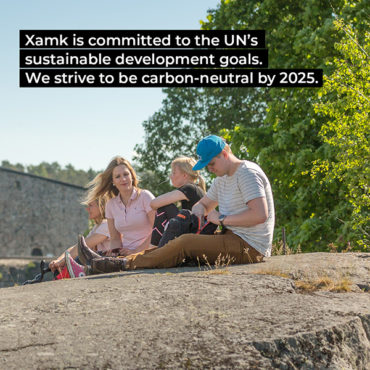Finnish universities of applied sciences have agreed on a joint programme for development and responsibility based on the sustainable development goals stated by the United Nations in 2015.
Throughout its operation since 2017, the South-Eastern Finland University of Applied Sciences, Xamk, has maintained that responsibility is one of the key strategical choices. At Xamk, the idea of responsibility covers the economic, social, cultural and environmental aspects and applies to all operations – education, RDI, finances and administration.
”The most recent act of responsibility was made in November, when we joined the UN Global Compact corporate sustainability initiative”, says Olli Ervaala, Director of Education Services, who is in charge of responsibility and sustainability at Xamk. “We are the first Finnish institute of higher education to be accepted in this network. We are currently updating our own responsibility and sustainability programme to comply with the Global Compact, and the results will be annually reported.”
By committing to the Global Compact, Xamk promotes the objectives, declarations and agreements of the UN. All members of the Global Compact make a promise of responsibility to their employees, clients, customers and owners and seek to set an example for other operators and society as a whole as to what sustainable conduct of business will be like in the future.
Xamk aims to become carbon neutral in 2025 
The objective of the joint programme of responsibility and sustainable development of Finnish universities of applied sciences is to ensure that their operation becomes carbon neutral by 2030. The programme aims to increase influential imprint and reduce carbon footprint. This has been further specified by 14 promises made on actions to be taken from the beginning of 2021.
In a performance agreement made with the Ministry of Education and Culture for 2021-2024, Xamk has committed to reaching carbon neutrality as early as in 2025. Carbon footprint will be calculated by a model jointly created by universities of applied sciences.
”If we wish to achieve this goal, it is essential that we cut down on traveling and prefer online meetings”, Ervaala states. “All our campuses have joined the WWF Green Office network. We use Green Office to monitor sustainable development on our campuses and in our cafeterias, for example food waste and consumption of heat and electricity.”
More information:
- Social Responsibility and Sustainability Report
- Arene info letter 24 November 2020: Universities of applied sciences: Sustainable development skills for everyone
- Programme for the sustainable development and responsibility of universities of applied sciences
- The UN Global Compact corporate sustainability initiative